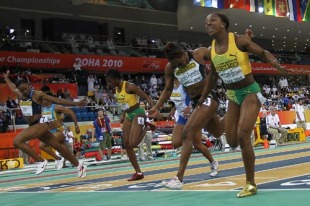- London Olympics 2012: Ten things
A hat-trick hunter

Each day of the Games we will bring ten facts you may or may not know about the great sporting spectacle that is the Olympics. Today we have some big names in athletics
An intriguing battle in store today in the women's 200 metres final, where the winner from the last two Olympics, Veronica Campbell-Brown, takes on the 2012 champions over 100m (Shelly-Ann Fraser-Pryce) and 400m (Sanya Richards-Ross). It could be the most hyphenated Olympic podium of all time.
If Fraser-Pryce should win she would become only the seventh woman to do the 100/200m sprint double, and the first since the late Florence Griffith-Joyner (another hyphen!) at Seoul in 1988. The others were Fanny Blankers-Koen (1948), Marjorie Jackson (1952), Betty Cuthbert (1956), Wilma Rudolph (1960) and Renate Stecher (1972). Campbell-Brown, meanwhile, could become the first woman to win the 200m three times - the only other double winner is the East German Barbel Eckert-Wockel in 1976 and 1980.
It's pretty much Ladies' Day in the Olympic Stadium, as the long jump and the 400m hurdles will also be decided. No British interest in the 400m hurdles after Perri Shakes-Drayton's heartbreaking near-miss, but there's a chance that Melaine Walker of Jamaica could become the first to retain the title in this event, famously won by Sally Gunnell in 1992. The 400m hurdles was added to the women's Olympic programme as recently as 1984, when Nawal el-Moutawakel became not only the first gold medallist from Morocco, but also the first female winner from any Islamic nation.
The long jump provided Great Britain with their first-ever gold medal in women's athletics, when "golden girl" Mary Rand pulverised the opposition in 1964. She set a new world record during an amazing set of six jumps, the worst of which would have won her the silver medal. That went instead to the great Polish athlete Irena Kirszenstein, who 12 years later (by then Mrs Szewinska) won gold in the 400m in Montreal. The fun-loving Rand collected a full set of medals in Tokyo: gold in the long jump, silver in the pentathlon, and bronze in the sprint relay.
The only men's track title to be decided today is in the 110m hurdles, scene of perhaps the biggest heartbreak at the 2008 Beijing Games when the local favourite, defending champion Liu Xiang, limped out with an injury. Britain's Colin Jackson won the world title twice at this distance - but the best he managed in the Olympics was a silver in Seoul in 1988. The only men to retain the Olympic 110m hurdles title are Lee Calhoun (1956 and 1960) and Roger Kingdom (1984 and 1988).
The 110m hurdles champion of 1952, Harrison Dillard, held the world record at the time of the London Olympics four years previously, but failed to qualify from the notoriously unforgiving US trials. He did, though, scrape into the 100 metres flat after finishing third at the trials - and atoned for his hurdles disappointment by winning the sprint at Wembley. Four years later, in Helsinki, "Bones" Dillard added the hurdles gold, and remains the only man to have won both.
In the sailing it's the medal race for the men's 49ers, an Olympic event since 2000, when Simon Hiscocks won silver for Britain (with Ian Barker) in Sydney: he also managed a bronze (with Chris Draper) in Athens in 2004. This time the British dinghy - sailed by Stevie Morrison and Ben Rhodes - might just nick a bronze, but the gold medal looks Australia-bound.
After Britain's success in the team show jumping, today it's the individual event at Greenwich. Rather surprisingly GB has had little success in this over the years - no individual golds, and the last medal of any sort was Ann Moore's silver, on Psalm, back in 1972. At the previous Games, in Mexico in 1968, Marion Coakes took silver (on little Stroller, which was actually a pony), and David Broome bronze on Mister Softee; Broome had also won the bronze in 1960, on Sunsalve. Peter Robeson also collected a bronze (on Firecrest) in Tokyo in 1964. The only person to have won two individual golds is the Frenchman Pierre Jonquères d'Oriola, in 1952 and 1964.
After the heady days of track success the focus on the bikes shifts outside to the BMX course next to the Velodrome in Olympic Park. Britain's main hopes lie with Shanaze Reade, who suffered a painful crash in the closing stages in Beijing in 2008 and missed out on a medal. Back in 2007 and 2008 Reade won the team sprint event at the track world championships, cycling with Victoria Pendleton (whatever happened to her?).
And on Horse Guards Parade it's the final of the women's beach volleyball, where the seemingly unstoppable Americans Misty May-Treanor and Kerry Walsh-Jennings are gunning for their third successive gold.

